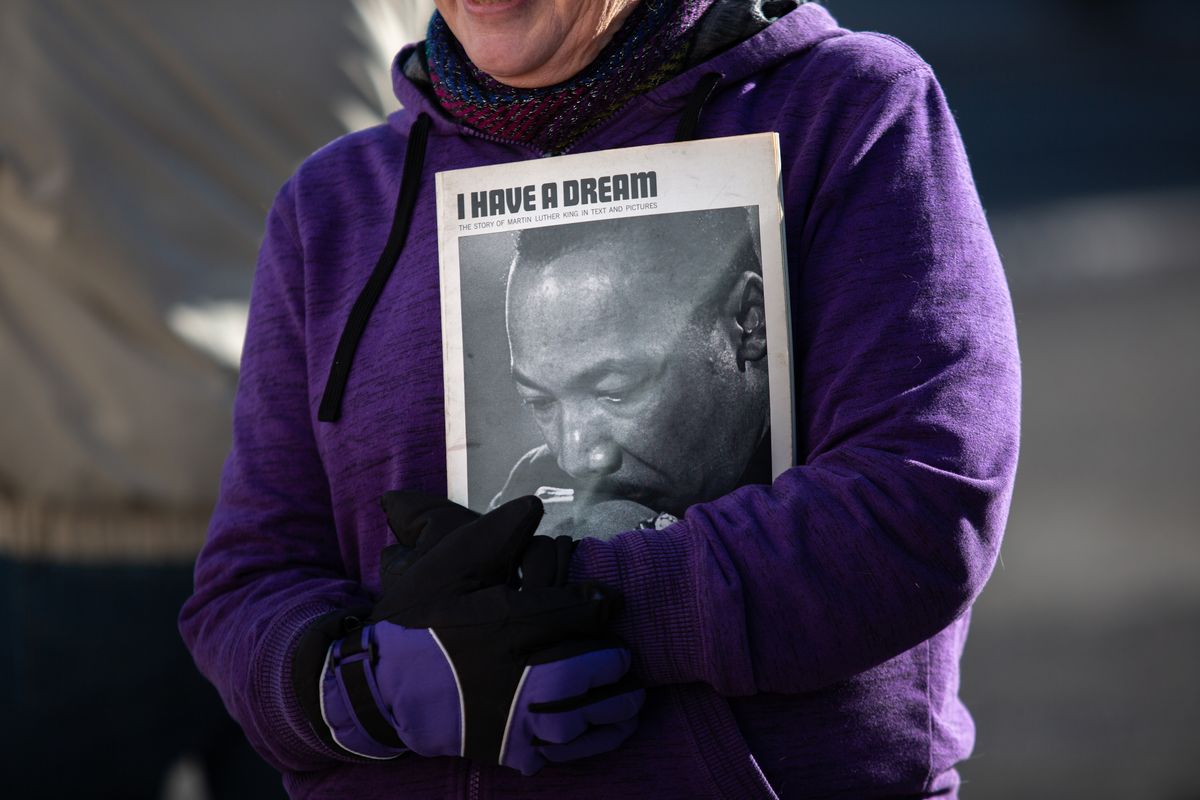Despite Capitol insurrection, new Spokane NAACP president’s Martin Luther King Jr. Day is full of hope

Kiantha Duncan, president of the Spokane chapter of the NAACP, said she believes in “brutal solidarity.”
In 1967, before Jim Crow laws were abolished and at the height of the Vietnam War, the Rev. Martin Luther King Jr. took an anti-war stance, despite many allies’ preference that he focus on issues at home, Time magazine reported.
In his 1967 speech “Beyond Vietnam,” he pointed out a “cruel irony,” that soldiers were fighting for justice in Southeast Asia that was not realized in the American South, and that in the war Black and white soldiers who could not attend the same schools at home stood in “brutal solidarity” against vulnerable and poor Vietnamese families.
“If America’s soul becomes totally poisoned,” King said, “part of the autopsy must read Vietnam.”
Duncan, inspired by King’s dedication to all of humankind, international and domestic, uses the phrase in another context.
She said, to her “brutal solidarity” means recognizing and valuing every person’s humanity against all odds, despite all differences.
“Love is at the core of all of this,” Duncan said. “I do believe in my heart it’s possible. If I didn’t believe it, I couldn’t have taken this position.”
King, she said, was not narrowly focused on elevating the lives of Black Americans, but aimed to root out all hatred anywhere, echoing words he wrote in his 1963 letter written from jail in Birmingham, Alabama, where he’d been arrested for nonviolent protest against segregation:
“I am in Birmingham because injustice is here,” he wrote. “Injustice anywhere is a threat to justice everywhere. We are caught in an inescapable network of mutuality, tied in a single garment of destiny. Whatever affects one directly affects all indirectly.”
Though Duncan said she sees much progress since King’s assassination in 1968, people still worry about their safety because of the color of their skin. People of color still work harder and longer, she said, to be viewed as equal “and then they’re still not seen as equal.”
In Spokane, she said she has been called racial slurs and driven off the road.
Earlier this month, she saw racist passions on full display on the national level. She said she was “glued” to the news as a mob toting Confederate flags smashed windows, injured police and stormed the Capitol.
Despite Martin Luther King Jr. Day falling this year between that insurrection and an inauguration that NPR reports will draw more than 20,000 National Guard troops to stand against domestic threats, Duncan said her strongest feeling is still hope.
She said she was nauseated but not surprised by the insurgence.
She said, for Black Americans, “our black neighborhoods have been the Capitol. We’ve seen this.”
“Although I was so sickened by it, the second thing I thought after ‘My God’ was, ‘I wonder will they see it now?’ Hate is hate. Hate is not good for anyone. Hate is the thing that will allow you to turn on your own. These are the same folks who said law enforcement should be respected, because they are civil servants here to protect our community and our world.”
“That, hopefully, allowed people to see you’re not just fixing this for people of color. You’re fixing this for everybody.
“We need to do this together. Otherwise, more than people of color are going to suffer – as we saw.”
She also finds hope, in the midst of an unstable nation, in the fact that a Black woman will be sworn in as Vice President on Wednesday, when Kamala Harris takes her oath of office.
“We still have that,” Duncan said.
Fifty years from now, Duncan hopes for a world where everyone values everyone, with no exclusions.
She said if America has overlooked something about King, it was the strength in his nonviolence.
“Love is at the core of all of this,” she said. “When love is your motivation, when love is the way in which you move, respond, show up – people can see that as weakness.”
“It’s tough to look in the mirror and see your shortcomings. America has to look in the mirror and say ‘Uh-oh,’ that we have to change.
“And if we actually are the country of the brave and strong, I think we can.”